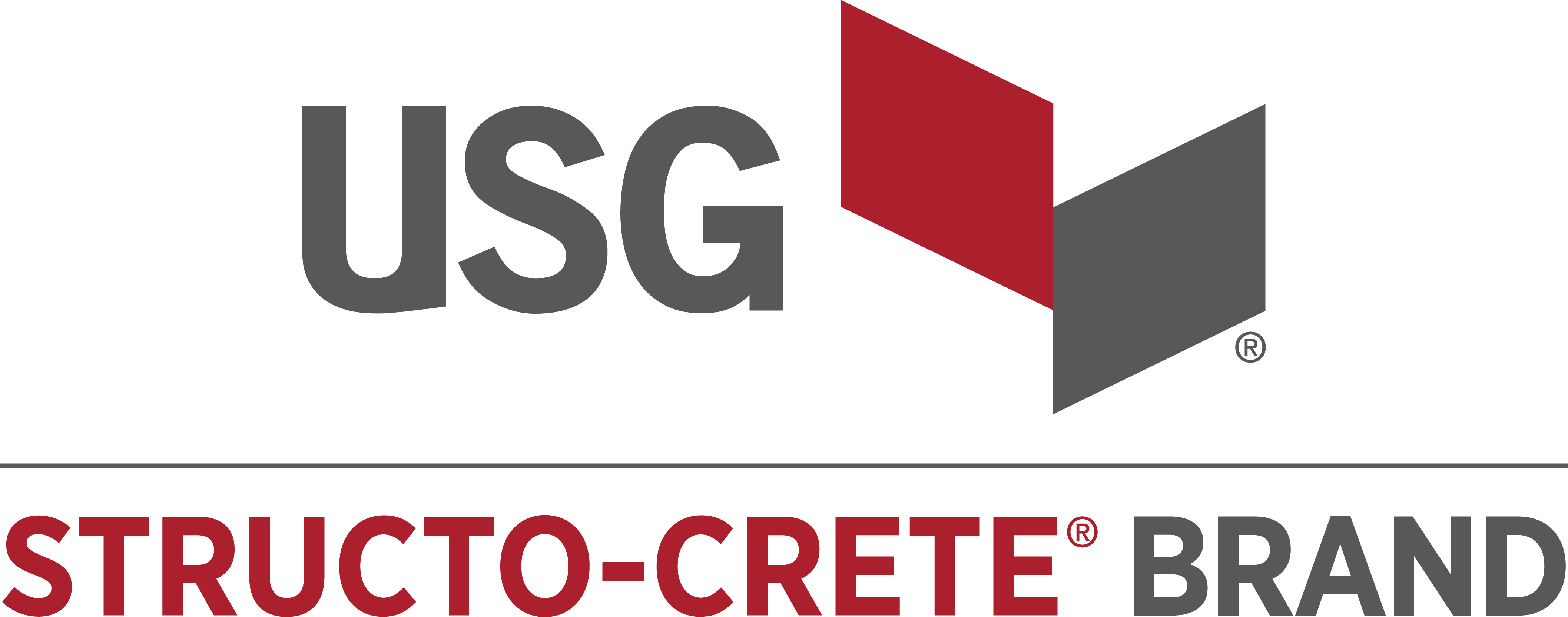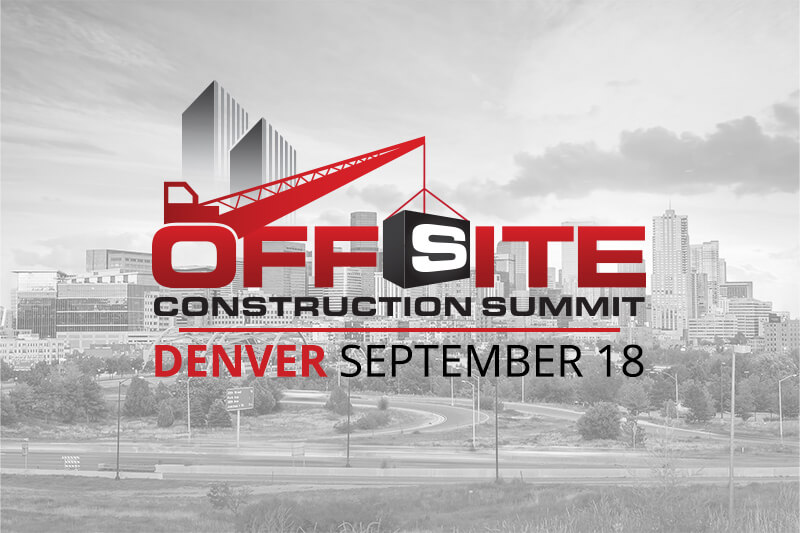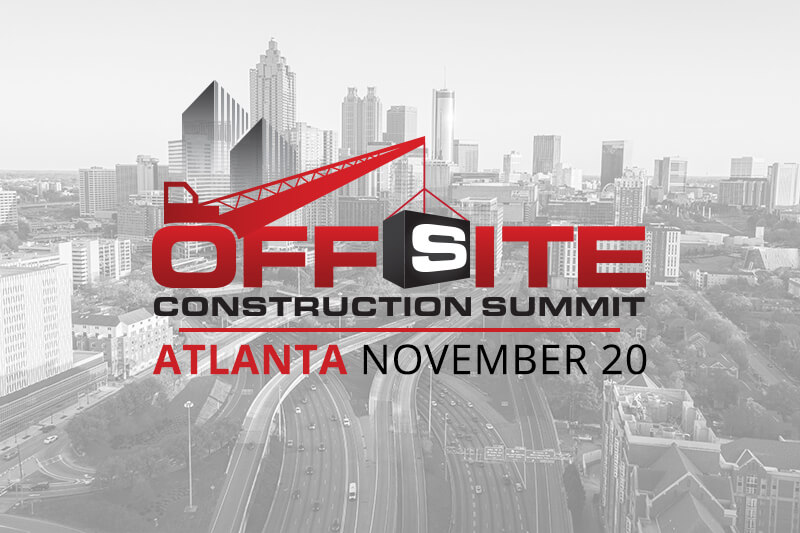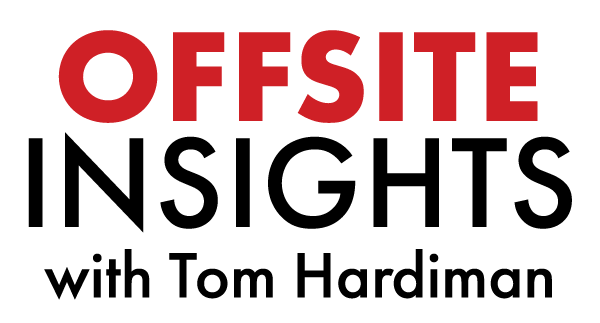
Inside Autovol's Automated Modular Building Factory
An interview with Rick Murdock, CEO & Co-Founder of Autovol
Rick Murdock joins Tom Hardiman to discuss how Autovol's automated factory is different than other modular building factories. Rick also discusses how as a people person, his staff is his focus when it comes to his company.
Interview transcript
Tom Hardiman 00:00
I'd like to thank today's sponsor for Offsite Insights. USG Structo-Crete brand structural panels are noncombustible mold moisture termite resistant, dimensionally stable panels for use and sub floor, roof deck or foundation wall assemblies. Structo-Crete brand structural panels meet the full criteria of ASTM E 136. For use and all types of noncombustible construction. Numerous one, two and three our fire designs are available for modular panelized and conventionally constructed buildings to meet virtually any application. The panels are easily cut with standard framing tools rapidly applied using mechanical fasteners and require no adhesive free installation. To learn more, visit www.usg.com/structocrete.
Hello, and welcome to another edition of Offsite Insights. I'm your host, Tom Hardiman and I'm joined today by Mr. Rick Murdock, CEO and founder of Autovol Volumetric Modular. Rick, how are you doing today?
Rick Murdock 01:11
Doing great, Tom, thank you very much. How about you?
Tom Hardiman 01:14
I'm doing great. Thanks for asking. Before we get started, why don't we jump in a little bit. Tell us a little bit about yourself, your background and how you got interested in this modular thing?
Rick Murdock 01:27
Well, I got interested in this modular thing at 20 years old. So, I've been doing it ever since then. I've now been in it 46 years and stayed in it because I love it. I think it really does have answers for people and I love working with people. So, I just spent my whole career in this industry trying to do as much as I can for it and for the folks around me. So yeah, I just love it. It'll be my career path for now.
Tom Hardiman 01:53
You know, that's getting a little harder to find somebody who started in this industry and then retired from this industry. It seems like we get some people jumping in and out. It’s good to have someone’s whole career here. It can be done.
Rick Murdock 02:07
It can be and it's a fun career.
Tom Hardiman 02:10
Yeah, absolutely. Well, Rick, one of the reasons we wanted to have you on today is to talk about your company Autovol, which I understand is kind of condensed version of automated volumetric. Is that right?
Rick Murdock 02:23
Yes, it is.
Tom Hardiman 02:25
You want to tell us how that came about? Then we'll dig in a little bit about what you think makes your factory a little different from some of the others.
Rick Murdock 02:34
All right, thanks. You know, like I said, I've been in the industry all my life. The last company I had, we built a heck of a good company out of that. It was a great company, but we sold that company back in 2017. Then I moved out of that and really got on the other side of the company, which really had to do with engineering, consulting, and so forth. Me and my partner started Prefab logic. It was during that time period that I realized, Rick, you're a manufacturing guy and always have been. So, I really had a desire to get back in manufacturing, but not the way we've always done manufacturing. I saw an advertisement to go to an automated event. I thought, Okay, I'm going to look it up and I went down there. I was surprised at the different automation and robotics they had. Immediately my mind, because of my career, went to how do we make this work for building houses? How do we make this work for building apartments? I linked up with a group that was really promoting that and I decided I wanted to build another manufacturing plant, but I wanted to go with automation, robotics. That's how we got started. I came back to my current partners and I said, I'm going to start up an automated manufacturing plant, and I'd like to have you be part of it. Thank goodness they jumped in and said, let's do it.
Tom Hardiman 04:00
Yeah, you all jumped in, I would say. Tell us a little bit about your factory. You say automated, well what does that mean?
Rick Murdock 04:09
Well, it's interesting. It's a 400,000 square foot factory, which is much larger than what you usually find in our industry, but it had to be that way because I spent about nine months, really working on the design for the automation, the robotics and understanding what it could do in making sure it can meet all the codes and so forth. By the time we got the automation design laid out, it was half the size of the building. So, I looked at the rest of manufacturing and what you do for production line and so forth, and drew up the rest of the building so we had a layout. I got the rare opportunity to build the plant around the layout. It just doesn't happen and very thankful it did here because it worked. The automation is about 200,000 square foot, the rest of it's all manufacturing and trades and so forth.
A little bit about the automation pieces, we've got a floor line, we have a ceiling line and we have a wall line like you'd find in most manufacturing facilities. And they're all three automated. What I wanted to do is bring in robots to take the heavy lifting off people and put it on machines, then have the people to really operate the machines, to tell the robots what to do. So, we have robots that do all the framing for floors, ceilings, and walls. When I say all the framing, it does all the layout, it does all the fastening, it does everything, then it moves into a sheathing line, which is also robotic. In that line, we've got robots that are applying the perfect amount of glue across all the substrates. We've got robots that are picking and setting all the sheathing materials such as decking, plus sheetrock, and then we have robots that fasten it all down in all three of those areas. Then we have robots that do all of our routes and cutouts. Really, that's the basics of it. It goes into a flip jig, and then it goes out onto the line where we do all of our MEP s. Really the construction piece is what's done with robots.
Tom Hardiman 06:18
Okay. The framing, floors, the walls, the ceilings.
Rick Murdock 06:22
Yes, sir. Then we've got all of our wonderful trades that we always have in our industry that pick it up from there, and they assemble the finished the unit, do all the MEPs and ship it out the door.
Tom Hardiman 06:34
Excellent. How many employees do you have when you're at your peak, when you're really humming along?
Rick Murdock 06:39
You know, right now we're just shy of five a day, and we're about 210 employees.
Tom Hardiman 06:46
Your factory is larger than the average factory. By our estimation, a typical factory might have about 120 to 150 people. So you're a good sized operation. I brought that up, because a lot of people immediately say, Well, if you're automated, that means less workers. How would you address that?
Rick Murdock 07:11
Well, based on the products we're building today if I didn't have any automation, we would probably have, I'm going to guess another 50 or 60 folks in the plant that would be helping us produce. But here's what it does do is it may take the place of someone doing that job, but it also creates other jobs along the way. The automation piece creates jobs, the maintenance piece creates jobs, the people that are going in and operate the machinery, it creates jobs. The other benefits you get out of that is not only increased jobs, but it creates a different employee base than what you would normally have in our industry. Now we have this wonderful, diverse mix of folks that have come out of college with a master's degrees in electrical engineering and aerodynamics. All these different things that are actually working with the machinery and operating the machinery. We have others that are writing codes for the machinery and that's usually not what you find in a typical manufacturing plant.
The other thing that we picked up very quickly and realized was that the average for women in the workplace is around 8%. We're 30%. They're excellent at what they do and they can do anything on the plant because it doesn't have all the heavy lifting and so forth. We found out a side benefit of all this automation is retention. In my career, manufacturing plants usually have a higher than normal rate of exits, because it is back breaking work. It's hard work. The automation along with the culture of our company really has retained people. Our turnover has been almost nil. Everyone is excited about working with automation, robotics, excited about providing affordable housing for those people that need it and trying to solve a problem that's everywhere. So, it's been a great experience. We're now just shy of 20 a week and we've been in operation for two years.
Tom Hardiman 09:25
Twenty a week?
Rick Murdock 09:31
Twenty modules a week and we work four days a week, not five. We work four tens. That's been another benefit that we found in our company. So, it's going very well, we're very pleased and we've proven the fact that automation robotics can build and build well with precision.
Tom Hardiman 09:45
Excellent. So yeah, you hit a lot of things there. Just the construction industry, you know, still onsite traditional construction industry very hard to find people. It's back breaking work. When I was much younger and in better shape I did it a few summers. I'm like, Oh, I don't want to make a living doing this. That's not a good long-term play.
Rick Murdock 10:09
That's how I came up in this industry as I started on the floor. So, I understand what everyone has to go through in that. I think what we've done here is we've kind of set the pace for where the future is going to be with manufacturing. We know we have labor issues out there, we know we got a lot of different things going on. When you look at all that coming together, it kind of points to what we're trying to get accomplished here and spread it.
Tom Hardiman 10:36
Excellent. Now I've been in our industry for about 20 years now, been in a lot of factories, and you mentioned the word automation, and you get this pushback right away. That's going to add them overhead, got to feed the beast and all these things, and it almost stifles any kind of automation or innovation. What would you say to other manufacturers? What is the one process that if you can only automate one thing in your factory, what would that be? What should everybody be automating at a bare minimum?
Rick Murdock 11:15
I think that, based on what we've experienced here, that the framing area. I'm not going to say easy, because it's not easy either, but it's probably the one that's got less challenges. It's the one that does an excellent job, that performs most of the time very, very well. All of it is good, but I'd say probably framing the best in automation at this time.
Tom Hardiman 11:41
Maybe your starting point, if you're looking at automating an existing factory, look at that frame.
Rick Murdock 11:46
Exactly. If you're going to go back, well, I'd say framing, because the wonderful thing about automation, and framing is precision. We know that if we frame with precision, then all the other finishes are much easier to do. I would say that if I was going to go out there and I had just a standard plant, I probably move with the framing first.
Tom Hardiman 12:08
Excellent. Okay. Well, you touched on a little bit about your culture and I see that on your website a lot. Tell me a little bit about that. You said your retention is zero, basically, almost zero. What is it about your culture? You mentioned the four 10 hour days, I mean, that that would sound fairly appealing, I think. What else is there that you think is unique?
Rick Murdock 12:36
I think our whole approach to the company is rather unique. One of the things I wanted to do when I built this plant was not only to run with automation, robotics, because quite frankly, those are just tools. You got to have people operate them just like you would a hammer. As much concern I had about starting this new wave here, my biggest concern was people and how do you get people? How do you keep people and how do you get the right people? So that's where we really put our focus. The plant is designed for people, we take a little bit different approach because we're here for the people. They're not necessarily here for us, right. We look to starting this company as bringing in and starting up a family. So even from day one, we get a little bit different interview process than what you find in a lot of companies. We went with the interview process of looking for character, right.
If a person had a pedigree that was awesome, we loved it. At the same token, if the character didn't match that degree, then they really didn't become a fit for our family. So every person in this company, still today and moving forward, is interviewed three different times. They're interviewed by management. They're interviewed by our people and the last interview for every person in this company has been me. I look at it just from the standpoint is how could I possibly help those people if I don't even know who they are and what their needs are? So we took that approach, we designed our plan to where it has one break room has one lunch room, and that's for everyone. From the office staff all the way out to anybody else in our company, we have given ourselves the name of solution ears, because if you look at our mission statement, and you look at what we're here to do. We're here to be a solution to problems and anything that comes up we're going to find a solution for it. We promote from within, we grow our people and we give them opportunity to grow and to increase their knowledge, increase their benefits, and move forward with the company to help grow the industry. As old as I am, I'm not going to be around long enough to carry it forward. So, we got to have some young folks in here to really take up the ball and run with it.
Tom Hardiman 14:55
Excellent. Well, it sounds like you're doing a great job there if no one's wanting to leave.
Rick Murdock 15:00
Now, it seems to be a very happy staff, but we do a lot with them. We have a lot of events, everything is circled around the people, because we put them first. We're out there to remove roadblocks and listen to what they're saying. In manufacturing, you got all these problems out in the plant. I have the deepest respect for anybody that's running a manufacturing plant. It is a full-time job every day, but if you go to those people that do that same job every day, they can most likely tell you the best way to get it done. If you've got a problem, they can tell you why they've got a problem. And if you listen, you can correct it and move forward.
Tom Hardiman 15:38
Yeah, that's an excellent point. They're the ones doing it day in day out, they probably know how to make it a little bit better.
Rick Murdock 15:44
Yes, they're probably wondering why it's the way it is for so long, right? Our folks are the answer. It's a people business and we happen to produce modules.
Tom Hardiman 15:55
Well, there you go. Well, that may lead into my next question, we'll get some interview type questions. What do you think you're most proud of over your entire career? Business wise, not necessarily personal wise, but what are you most proud of?
Rick Murdock 16:10
I'm proud of the people, people we grow and watching them advance. I met so many people through the years, and I see them in all different positions. The most fun I have in any manufacturing plant is with the whole group of people in the team. It's a team, it's a team business, right? Everybody must be one team. It's been very rewarding.
Tom Hardiman 16:32
Good people, a lot of good people in this industry.
Rick Murdock 16:35
A ton of good people in this industry and we needed a character we needed to grow.
Tom Hardiman 16:40
And it's so much in character. There's a lot of characters in this industry.
Rick Murdock 16:44
And all different types of diversity is awesome.
Tom Hardiman 16:48
So, you said you build 20 modules a day, you guys are building mostly multifamily for the housing.
Rick Murdock 16:56
Yes, 20 modules a week, and we build only affordable housing, multi-story, multifamily. So, our typical build is going to be five stories over a podium is going to be our typical build. That's really what we focus on. We believe that the affordable housing sector is the one that's in need the most just about anywhere you go.
Tom Hardiman 17:15
I wrote something today on LinkedIn about it, it's unbelievable. Any city you go to has housing issues, any town, it's not even big cities, it's everywhere.
Rick Murdock 17:27
I'm not trying to replace typical construction, because I don't think it's possible to ever do that. Nor should we want to. What I'm trying to do is encourage typical construction and manufacturing to come together to solve a problem, because it's going to take both of us. We've got answers that they don't have, and they've got skill sets and trades that we don't have. I think that if we can ever come together instead of working against each other, that will have a true resolution of what our housing problems are, and be able to produce much better, much faster, and less expensively.
Tom Hardiman 18:02
Now, I agree there's a massive need for construction and there's no way we could do it. And there's no way we can keep building it conventionally. So, we've got to learn to work together, automate and industrialize where we can try to put a dent in this.
Rick Murdock 18:18
I agree. I agree. That's what we're hoping for.
Tom Hardiman 18:22
Well, what are you working on these days, many exciting projects out there, or maybe a little longer term view? Where do you see your company going in the next two, three, four years?
Rick Murdock 18:34
Well, we're still ramping up in production. I think that we'll be able to supply everything out here for at least a short period of time. I've got other companies that I'm very much involved in that are going out trying to help others create the same thing we created here. We just recently announced our P4 housing collective. That has to do with plants, pre con, people. So, we're really looking at that and we're really stretching out there trying to help others try to create something similar to what we have, or at least be in this industry to try to solve problems.
Tom Hardiman 19:15
You don't hear that often from a modular manufacturer saying I want to help other people do what we do.
Rick Murdock 19:22
I'm big believer in that because we both know that there's been modular plants that failed. There's been companies that have failed. When you look back at that, I think that as an industry if we were involved in trying to help each other instead of protecting our top secrets that most everybody knew anyway, we might have prevented some of those from failing and our industry would be much stronger than what it is today. So we're all about sharing what we know and shared successes.
Tom Hardiman 19:50
Well, that's a great attitude and I hope more companies have that same philosophy because I think it'll benefit all of us
Rick Murdock 19:58
There are a lot of good manufacturing plants out there and a lot of good folks running them. I'm hoping that we can grow the industry. We've got the most unbelievable time in our history to grow this industry and it's needed badly. So, I'm excited about what you're doing and what you're helping us do and hopefully we all come together and just help promote it and make it something that's more common than uncommon.
Tom Hardiman 20:27
Absolutely. Well, Rick, I appreciate you being here with me today and taking a few minutes to tell your story and Autovol’s story. Look them up online. I forgot how many robots you actually said you have in the factory. Is it 50?
Rick Murdock 20:42
We have about 60 robots.
Tom Hardiman 20:45
I got to get up there and check it out sometime soon. I keep saying that.
Rick Murdock 20:47
You need to each one of them has a name, Tom. So come in and meet the rest of our staff.
Tom Hardiman 20:52
Absolutely. So, you're in Idaho. Napa, Idaho. If you're in that area, look them up. Check them out. It's got some other members in a nearby region in Boise. So that's a great hub for the modular industry up in your neck of the woods.
Rick Murdock 21:10
It is especially Treasure Valley. Oh, my goodness. There's six different manufacturers in the Treasure Valley right now. All producing housing. So it's a great area. Good manufacturers.
Tom Hardiman 21:22
Good deal. Good deal. All right. We appreciate your time here today. This is Rick Murdock, CEO of Autovol. Appreciate your time and sharing your insights with us and hope that you stay tuned for another edition of Offsite Insights coming soon. Thank you, Rick.
Rick Murdock 21:37
Thanks, Tom. Come see us.
Don't Miss Our Upcoming Events!
Join the leading companies and professionals from across the offsite construction industry at each of this year's Offsite Construction Network events. With summits and expos taking place across North America in 2024, it's never been easier to connect with and learn from offsite construction manufacturers, designers, builders, and suppliers from the United States and Canada.
Subscribe today to get the latest updates on these and future events from the Offsite Construction Network.
